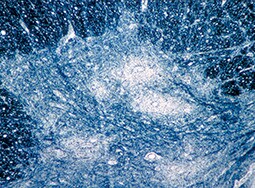Public health officials’ international hunt for clues in the case of polio that paralyzed a New York man has turned up a big one: The virus that infected him matches the genetic fingerprint of poliovirus found in sewage samples taken in London and in the Jerusalem area, officials at the Centers for Disease Control and Prevention and the World Health Organization told ProPublica on Friday.

Microscope image from 1964 made available by the Centers for Disease Control and Prevention shows damage from the polio virus to human spinal cord tissue.
It is not yet clear how the virus moved from one place to another or where it was first.
“That is still being investigated,” Oliver Rosenbauer, communications officer for WHO’s Global Polio Eradication Initiative, said in an email.
The hunt for answers in countries thousands of miles apart shows how viruses can hopscotch across the globe. Polio is highly contagious and, because the majority of infections cause no symptoms, it can circulate silently through communities where there is no routine monitoring.
ProPublica reported on Tuesday that U.S. public health agencies generally haven’t tested sewage for evidence of polio, relying on high vaccination rates to protect Americans from the disease, but there are signs of cracks in that shield, both here and abroad.
Waiting for patients to show up with symptoms can be perilous: By the time there’s a case of paralysis, 100 to 1,000 infections may have occurred, public health experts say. New York health officials began screening wastewater only after the case there was identified.
The New York case was the first in the U.S. in nearly a decade. It was discovered after a young man in Rockland County, a suburban area northwest of New York City, sought medical treatment in June for weakness and paralysis. He had not been vaccinated against polio. It was well into July when tests confirmed he had polio.
Genetic sequencing confirmed that he had what’s called vaccine-derived polio. This kind of polio is linked to an oral polio vaccine that hasn’t been used in the U.S. since 2000. The oral vaccine, still used in other parts of the world, relies on weakened polio viruses to trigger the immune system and create protective antibodies. In rare instances, when the weakened viruses circulate in people who have not had the vaccine or are under-immunized, they can revert to a form that can sicken unvaccinated people.
Public health officials said the traces of poliovirus found in sewage samples from early June in Rockland County and greater Jerusalem were still too weak to cause paralytic polio. It’s not clear where the virus evolved, becoming powerful enough to cause the Rockland County patient’s illness.
A spokesperson for Rockland County’s Health Department said she could not confirm whether the man had traveled to London or Jerusalem this year.
Another mystery in the case is that like the U.S., the U.K. hasn’t used the oral polio vaccine in years. Instead, both use only an injectable vaccine that contains inactivated viruses and cannot cause vaccine-derived polio. Though Israel does use oral polio vaccine, the version it uses does not contain the strain of polio, known as Type 2, that’s turned up in the sewage samples or that infected the New York man.
New York officials say they are now testing both stored sewage samples, which were collected as part of the effort to track COVID-19, and more recent ones for signs of polio.
While high vaccination rates in the U.S. have made the risk of polio remote, some communities have far lower vaccination rates than the country overall. Rockland County in 2018 and 2019 struggled with an extended outbreak of measles — also preventable with vaccination — that was concentrated in its Orthodox Jewish community. Some news organizations have reported that the man paralyzed with polio is a member of that community.
Most Americans aren’t old enough to remember, but in the first half of the 20th century, polio ranked among the nation’s most feared diseases. It victimized mostly young children, attacking their spinal cords, brain stems or both, and left thousands with irreversible paralysis. After the first vaccine was approved in 1955, U.S. cases dropped precipitously within a couple of years.
Source: Read Full Article
